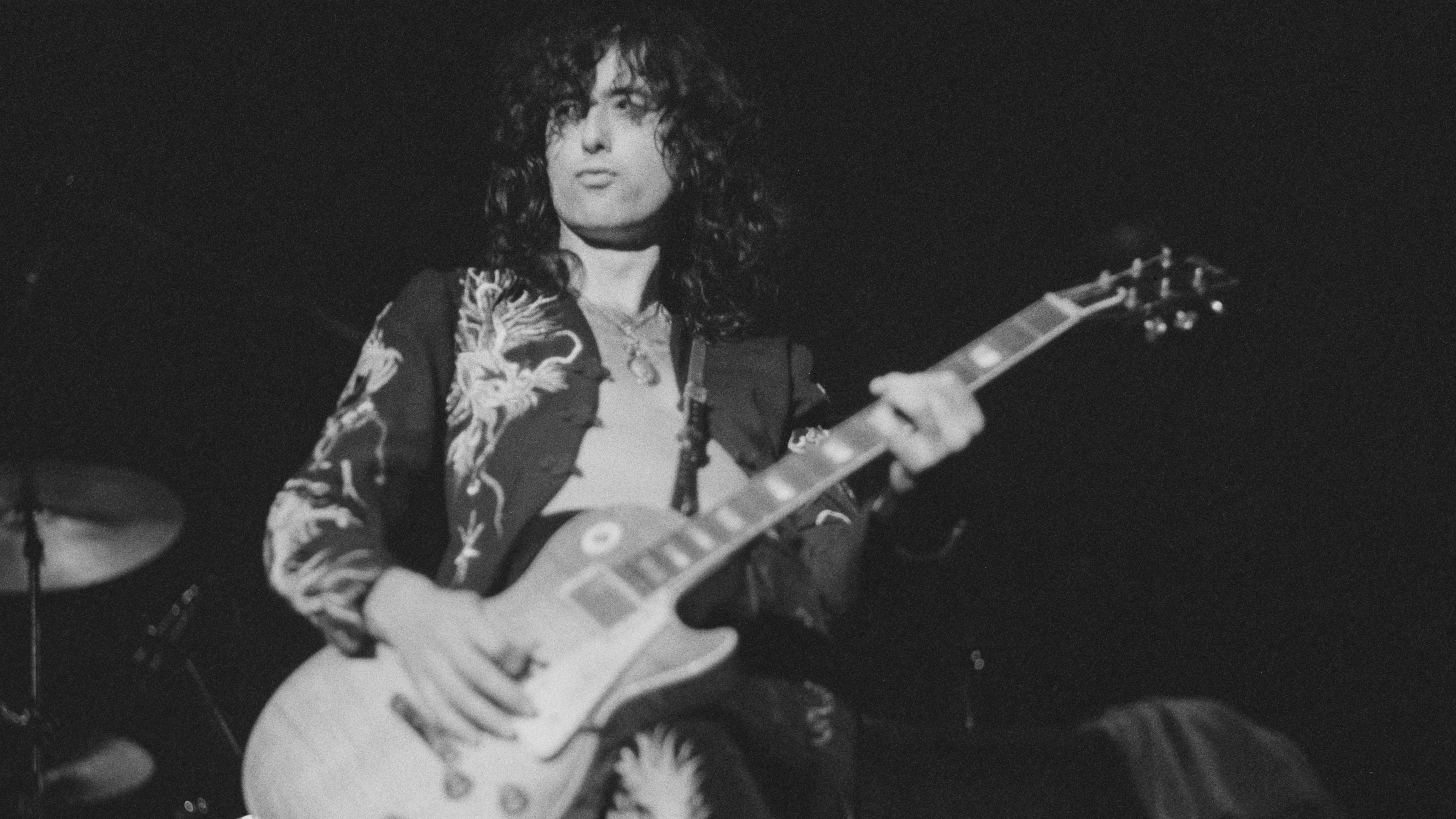
Today Jimmy Page turns 80, so we're paying tribute to the rock god's rock god, an undisputed guitar behemoth. Here, in an exclusive with Guitarist magazine back in 2014, Page talks us through his autobiography and opens up about the instruments that shaped his early path from teenage pretender to star of the London session scene, the Yardbirds... and beyond.
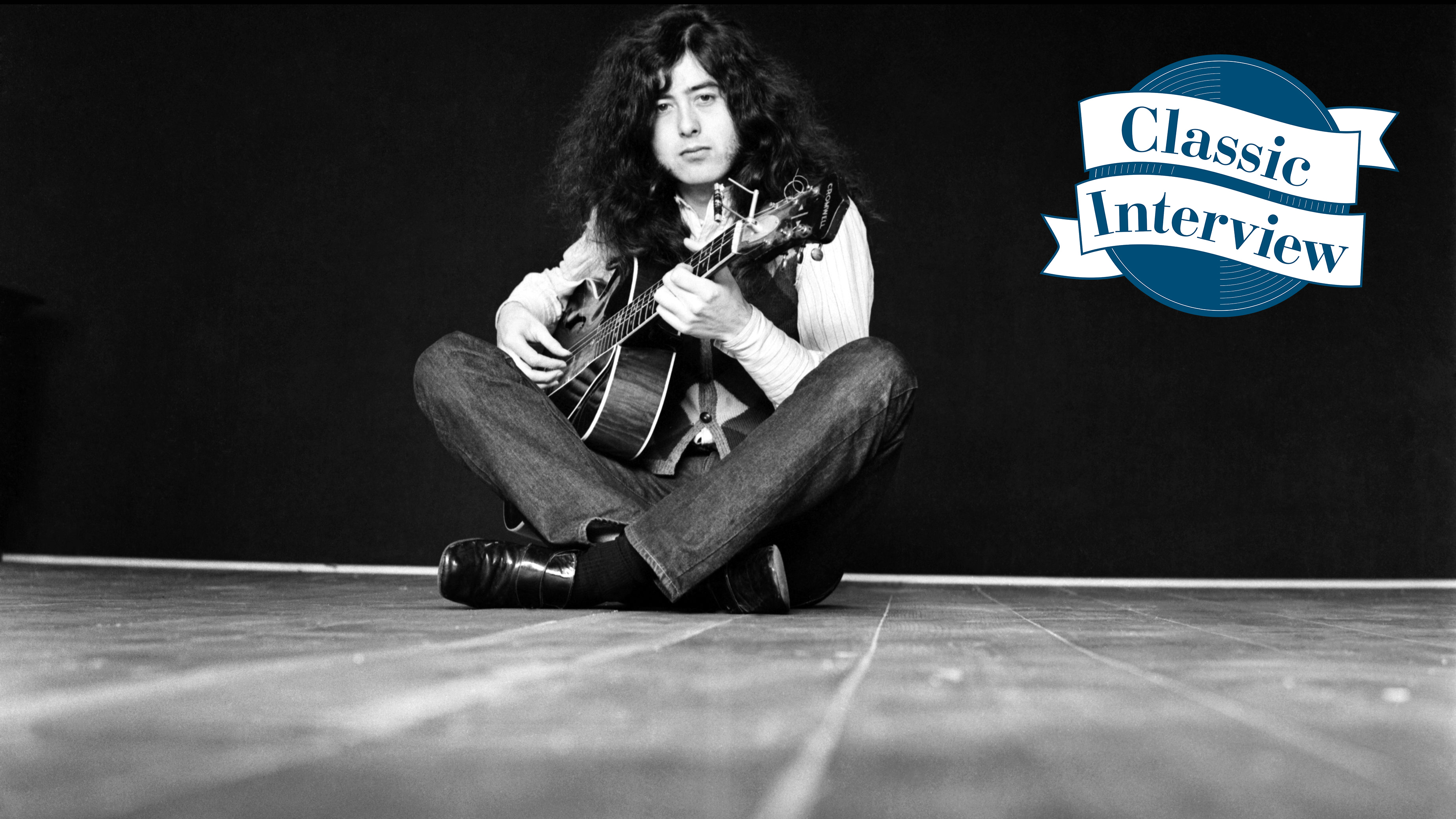
Jimmy Page at 80: Jimmy Page is sitting in a London hotel talking about the book that tells the story of his musical life. He leafs through the copy on the table in front of us and points to one of the many photographs. He’s about 20 years old, frozen in black and white while recording one of the innumerable studio sessions he took part in back in the 1960s.
“Do you know what’s really interesting?” he asks. “There’s all these pictures in here of me in the studio doing sessions with various people, and yet when it comes to Led Zeppelin, the only time that we’re in the studio being photographed is across the second album. Isn’t that interesting? So, pro rata, there’s more of me at those studio sessions, when you wouldn’t think there’d be anything. I just find it ironic. But it was interesting, sieving for gold...”
The 70-year-old Page looks dapper - all in black, silver-haired - in a wafer-thin, ageing gracefully, rock star kind of way. He’s very enthusiastic about his book, very proud, and he’s intrigued by the idea that its procession of pictures can also tell the story of his guitar life.
“That’s what we’ve got to do,” he says with a grin as he turns more pages and reveals the sequence from Grazioso to Les Paul to Telecaster. “We’ve got to try and explain what it is and why it is.”
The early material in Jimmy’s book is especially interesting. There are fascinating connections and links during the decisive years from the period in which he acquires his first guitars, through the studio sessions, and on to The Yardbirds and the first months of Led Zeppelin.
Page turns to a picture of himself playing live with Neil Christian & The Crusaders, supporting Cliff Richard, probably in 1960. He’s got his Grazioso electric and he’s on his knees with it at the front of the stage.
"I got used to big bass drums before hearing John Bonham"
“The interesting thing here,” he says, “is that my body language is exactly the same as something from 1977 in the white poppy suit, pictured later in the book. And we had a superb drummer in that band, a drum major in the army.
"He had a load of swing, he loved all the big-bands. Look at the size of that bass drum! So I got used to big bass drums before hearing John Bonham - someone else who had an amazing swing to his playing.”
There’s a lovely picture in the book of you as a teenager in front of someone’s fireplace with a Grazioso or Futurama...
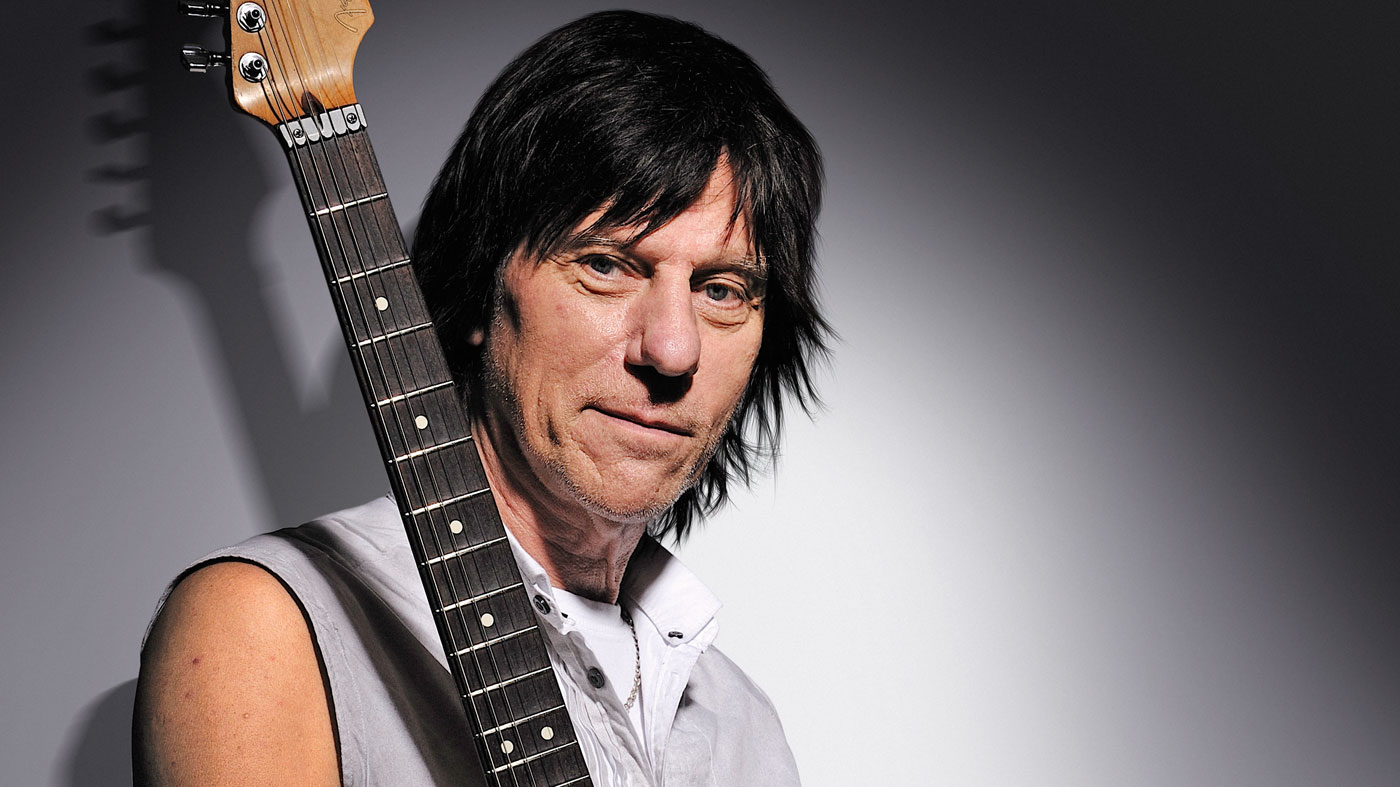
Classic interview: Jeff Beck on his love of the Strat and working with Rod Stewart
“Isn’t that great? That’s the first electric guitar I got. The one before it, a Hofner, my dad bought, but... maybe he was psychic, and he knew what was coming. Because there’s a whole procession of guitars that come into my life over the next few years. I’m either 14 or 15 in that picture, it’s 1958, or probably 1959, and that’s the first one, the Grazioso. It looked and felt like an electric guitar, even though it wasn’t a Fender.
"In fact, it had a tremolo arm on it, and I’ve got recordings of me playing on this thing, but you’d think this arm would break, actually. I heard somebody, a sort-of record collector, he told me, ‘You’ve got to hear this Carl Perkins stuff ’ - and it’s terrific guitar playing, he’s a real stylist.”
Were you thinking, ‘Actually, I really want an American guitar’?
“Oh, this is a result of seeing and drooling over Gene Vincent & His Blue Caps, by the time they’re doing Hot Rod Gang [1958 movie] and they’ve got all those Fenders. It was oh... my... god.
"I’ve seen Bruce Welch talk about when he saw the Fender with Buddy Holly on The Chirping Crickets album, and he describes it exactly the same way as I felt, too, which is: that thing looks like it’s from outer space! What is it?!
"So, you find out, and then you see them, and they’ve been sprayed in almost hot-rod colours, and they’re all matching. It just looked so damn sexy! The Fenders were sexy to begin with, just beautiful, sculptural designs. Then when you saw a whole nest of them, with the bass and the guitars and Gene Vincent standing there, well...”
Guitars in those days, they weren’t all user-friendly, you know?
What was the first American guitar you got your hands on?
“I did get a Strat along the way. But guitars in those days, they weren’t all user-friendly, you know? Just because it was a Strat, didn’t mean to say it was like a Strat we know now. Then it goes from that to one of those orange Chet Atkins Gretsches, and then pretty much from there through to the Les Paul Custom.
"In [2008 documentary film] It Might Get Loud, that was nothing to do with me whatsoever where they’ve got [the caption] ‘Jimmy Page’s first electric guitar’ and they show a picture of a Strat. I don’t know whose Strat it is. The reality of it is, that Grazioso was the first electric guitar.
"Here I am with these guys, but up in Liverpool, there’s pictures of George Harrison playing one, too. So, that guitar was as good as you were going to get around that point of time.”
There’s a picture with you posing with your Les Paul Custom and some Selmer and Fender amps...
“None of it was mine apart from the Les Paul Custom - and I’m wearing clothes from John Stephen in Carnaby Street.
"Anyway, I went in this shop, and they asked me to do a photograph with all the amps that they were promoting. I guess I must have had enough of a reputation for them to want to take a picture of me with their amps, even though I was just a studio musician. I was doing both, art college and sessions.”
There weren’t many Les Pauls in Britain at that point in time...
“No, there weren’t. It was just such a gorgeous-looking thing. It just sounded so wonderful. The middle setting wasn’t what you’d expect it to be, it was a spiky sound that was really superb.
"It’s the one that got stolen later, and eventually Gibson said to me ‘what sort of guitar shall we make you?’ And I said ‘I know exactly what guitar: we’re going to do a Custom so you can get all the pickup combinations.’ I played it at the O2, and it sounded bloody marvellous. Everyone was saying that guitar sounded the best of anything that night.”
You used the Custom on many sessions in the 60s...
“Yes, and also I introduced my semi-acoustic Danelectro into the world of sessions. The first session was when Glyn Johns put me in the Jet Harris & Tony Meehan thing, Diamonds, but I was really young then, it was way before that.
"Later, I was at art college and I was playing in the interval band in the Marquee, when the Marquee was on Oxford Street, and somebody there said, ‘Do you want to play on a record?’ I said ‘yeah, absolutely’. So I went along and took my DeArmond [tone and volume] pedal and all the rest.”
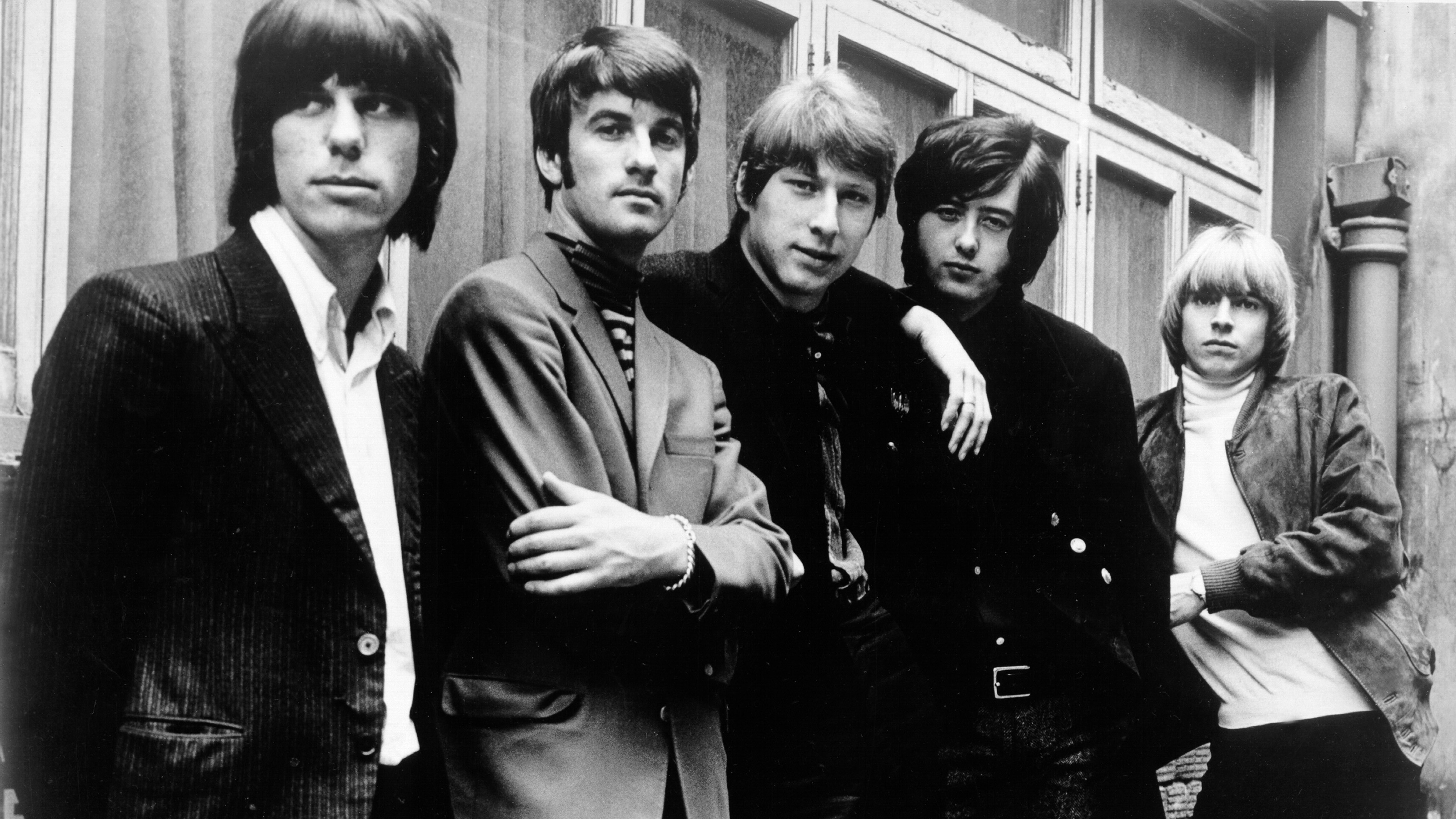
It was an apprenticeship, and I became so accepted behind that closed door
Did you have to read music?
“At one point, they came along and gave me a piece of music, and it had dots on it. Just a little bit. And I thought, ‘uh-oh. This obviously means either: we’re going to kick you out, or: you better bloody well learn to read music a bit sharpish because we’ve got things which are more demanding of you.’
"I’d be playing on film scores, on television adverts, on folk sessions, I’d be playing middle-of-the-road music, playing with groups, I’d be playing with singers that were from groups where they’d substituted group members with session musicians. I’d have people coming in from France, from America, right across the board, all kinds. And now I’ve got the hint: you better learn to read music!
"So I sort of did, I got to read music. In the early days, there were some sympathetic arrangers who would actually give you your part first, so you’d have a chance. But I’ve got to tell you - reading the sort of fluent notes, that was all right, but when it was chords written, it was ‘oh my god, why don’t they just write down the chord names?’ That was testing.
“And here’s the key to it. I’d played so many different styles of guitar, I’d played fingerstyle on my Harmony acoustic, and I’d played blues, and I knew how to play rock - I knew where the roots of these things came from.
"Also, I learnt to be able to ask a lot of questions, to the engineers, about certain things that I’d heard. I’d play things to people, say ‘what’s that? How’s that done?’ It was an apprenticeship, and I became so accepted behind that closed door. I’m experimenting with the bow, too, although I’m not doing anything on pop records with that.
"I’m doing all of this, all my friends are off having a great time, and I’m faced with f**king muzak. And it’s like, ‘okay, this is it, this is the moment, it’s time to go.’ Everyone’s been really kind, and you think: thanks so much, but I really want to be on my way. I just had so much that I wanted to do.”
I met Jeff [Beck] when we both had homemade guitars, so we go back that far
You joined The Yardbirds, and Jeff Beck had his Sunburst Les Paul, so you got his Telecaster...
“He came round one day in a brand new [Corvette] Stingray and gave me that guitar. It’s the Yardbirds guitar, but I wanted to make it my own, and that was when I painted it.
"That’s the only area that tells you the boy went to art college, the only thing that illustrates that, the fact he painted his Telecaster. Well [laughs], it wasn’t a wasted opportunity, then, was it?”
What was your musical relationship like with Jeff?
“It was really good, great. I don’t know how old he says we were when we met, I think he reduces the years to almost 11. His memory’s bloody good, I’ll tell you that much. You know that by his guitar playing: he’s got a photographic memory.
"I met Jeff when we both had homemade guitars, so we go back that far, when we’re seeing who’s got the closest version of My Babe by James Burton. Just two kids really enthusiastic and passionate about music and guitar playing.
"Anyway, Jeff had said it would be great if we both played in The Yardbirds together. That was what he said, and I said I didn’t really think it was going to be possible, because there was this union, five Yardbirds - five live Yardbirds - and it didn’t seem that that was going to be six, to have even more guitars.”
You did end up joining The Yardbirds, but you started on bass...
“Yes, because Paul Samwell-Smith left the band and they had dates to do. I’ll tell you what, that was a hard gig, doesn’t matter if I’d done sessions or whatever: I’m playing bass and trying to fill Paul Samwell-Smith’s shoes, and that was tough.
"But the idea was that Chris [Dreja] would take over the bass and Jeff and I would play guitars together, so we did stuff where I do a bit of bowing, doing stuff like Over Under Sideways Down in harmony guitars. It was just fun. It was really good and promising. There wasn’t anything like that, not what we were doing or were planning.”
There are some pictures of you playing Jeff’s sunburst Les Paul...
“I had no choice, I had to take over on guitar if he walked off. What else are you going to do? Walk off with him? It was usually because the amplifiers were playing up, or something.
"All in all, knowing Jeff ’s sort of technique and his precision, I can understand it, but at the time it was ‘oh my god, he’s being really temperamental here’. But he was in the whole world of what he was trying to do, and shaping his sound. So I’ve got to play the stuff that’s been done before, but I’m really keen to move it into other areas and put my own stamp on it.
“The stuff that I did sort of collides with singles that have to be done, and you try to put the stuff that you’re really doing on the B-sides - Think About It, Puzzles, the bow, it’s all coming in.
I knew, when it came to the time of Led Zeppelin, exactly what I wanted to do
"You have no idea how quickly the Little Games album was recorded. ‘Right, red light’s on, take, next...’ because [producer] Mickie Most didn’t like albums, he only liked singles.
"That’s why I knew, when it came to the time of Led Zeppelin, that’s how I knew exactly what I wanted to do. Exactly how I was going to go about it, exactly what material. There was an audience for it, if I got a good band together.
"And I didn’t just get a good band, I had a phenomenon together. It was really exciting! Imagine! But when people talk about Zeppelin as musicians... everyone dreams of being in a band like that.
“I really wanted The Yardbirds to continue, because I really believed in it... we’d done some recording in the studio, we’d also done a live thing, none of it actually was supposed to come out – I don’t know what sort of leaked out on bootleg – but I had sort of an idea, I had material to be done.
"They wanted to try something else, they didn’t want to be The Yardbirds any more, so that’s it. I know what I’m doing, I’ve had this period now coming out of the studio, really studio-disciplined, I know how to do things and I know how to approach the next stage, certainly in my life, and how it relates to America.”
That fat sound on the Les Paul, you’re inspired. Well, I am
So you took the Telecaster with you into Zeppelin, and that lasted for the first-album period, before you got your own Sunburst Les Paul...
“Absolutely, the first album is done on the Telecaster, because it is a transition from The Yardbirds to Led Zeppelin, it’s exactly the same guitar. It’s not until 1969 that I get the Les Paul, when Joe Walsh insists on me having this guitar.
"He bloody insisted, he said, ‘You’ve got to buy this guitar!’ I said I didn’t necessarily need it. ‘No, you’ve got to have it, just try it, you’ll want it’. I said, ‘I’ve already got the Custom’. ‘No, no, you’ve got to try it!’
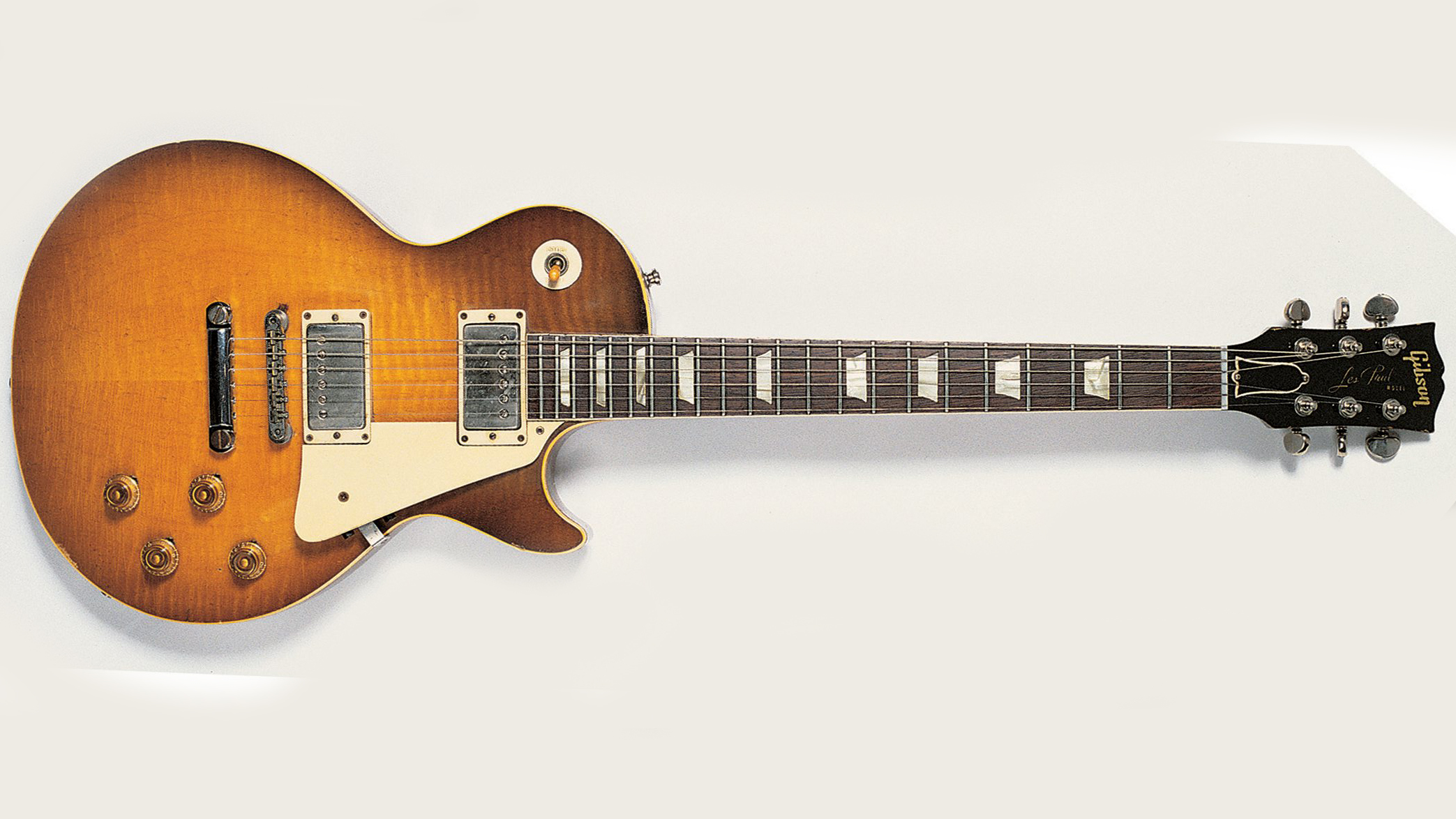
"I knew it was a good guitar. I knew there wouldn’t be the feedback, the squealing you got from the Telecaster - every night there was a whole episode of controlling that. Everybody had that, if they started turning up a Telecaster loud, you know? So I did buy it, and I kicked off the second album with it. It was a pro rata price, he wasn’t stealing me up, and he wasn’t giving it to me as a present.
“It’s the intervention of the guitar again. My first one was left behind at a house we moved into. Then there’s the energy-charged guitar in The Yardbirds that Jeff Beck had. Then Joe Walsh insists I buy this guitar. The intervention of the guitar again.
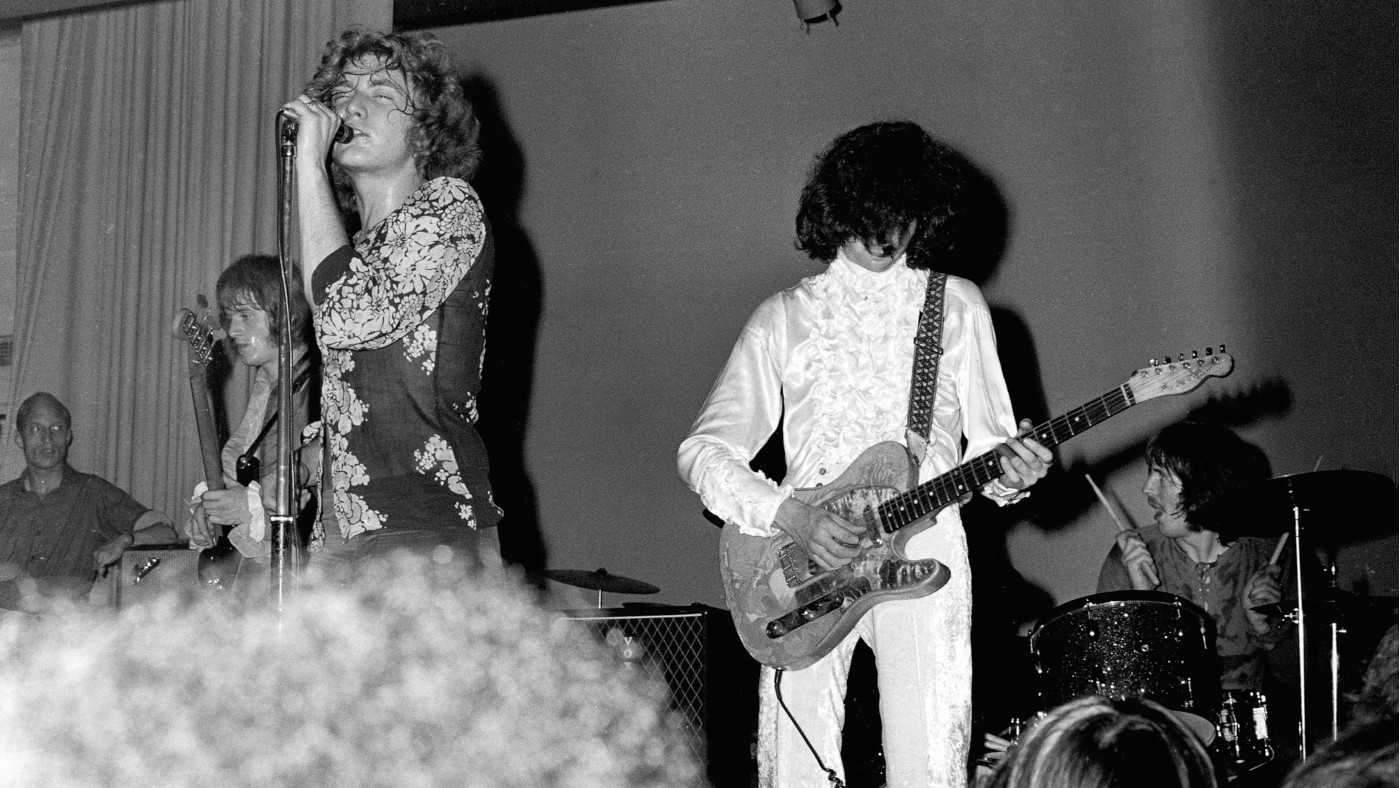
"That Les Paul was a beauty. It wanted a new home, so I took it home. I had it right through to the O2 [2007], and that’s unusual. Most people have got other guitars they’ll play, but no matter what, it’s the same Les Paul.
"It’s hypothetical, but I may not have come up with the riff from Whole Lotta Love on the Telecaster. That fat sound on the Les Paul, you’re inspired. Well, I am, and I know other people are inspired by the sound of particular instruments. Suddenly they’re playing something they haven’t played before, and it’s really user-friendly, and suddenly they’ve got some sort of riff, which is peculiar to that moment. So many things start singing, you know? Really singing.”
For updates on Jimmy Page visit jimmypage.com







